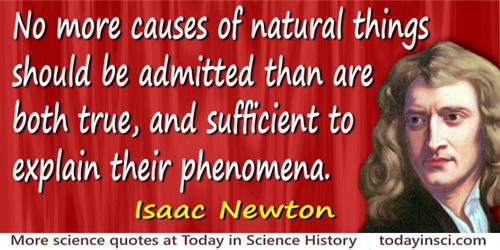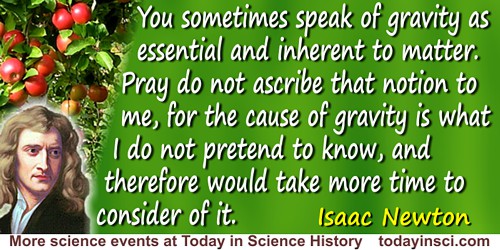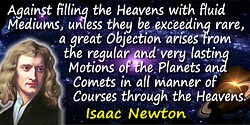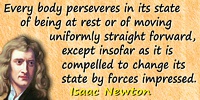 (source)
(source)
|
Sir Isaac Newton
(25 Dec 1642 - 20 Mar 1727)
English physicist and mathematician who made seminal discoveries in several areas of science, and was the leading scientist of his era.
|
Sir Isaac Newton Quotes on Cause (22 quotes)
>> Click for 109 Science Quotes by Sir Isaac Newton
>> Click for Sir Isaac Newton Quotes on | Action | Attraction | Body | Color | Colour | Effect | Experiment | Explanation | Force | God | Gravity | Heat | Hypothesis | Law Of Motion | Light | Matter | Motion | Nature | Orbit | Particle | Phenomenon | Philosophy | Planet | Principle | Proportion | Ray | Sun | Truth |
>> Click for 109 Science Quotes by Sir Isaac Newton
>> Click for Sir Isaac Newton Quotes on | Action | Attraction | Body | Color | Colour | Effect | Experiment | Explanation | Force | God | Gravity | Heat | Hypothesis | Law Of Motion | Light | Matter | Motion | Nature | Orbit | Particle | Phenomenon | Philosophy | Planet | Principle | Proportion | Ray | Sun | Truth |
And for rejecting such a Medium, we have the Authority of those the oldest and most celebrated Philosophers of Greece and Phoenicia, who made a Vacuum, and Atoms, and the Gravity of Atoms, the first Principles of their Philosophy; tacitly attributing Gravity to some other Cause than dense Matter. Later Philosophers banish the Consideration of such a Cause out of natural Philosophy, feigning Hypotheses for explaining all things mechanically, and referring other Causes to Metaphysicks: Whereas the main Business of natural Philosophy is to argue from Phaenomena without feigning Hypotheses, and to deduce Causes from Effects, till we come to the very first Cause, which certainly is not mechanical; and not only to unfold the Mechanism of the World, but chiefly to resolve these and such like Questions. What is there in places almost empty of Matter, and whence is it that the Sun and Planets gravitate towards one another, without dense Matter between them? Whence is it that Nature doth nothing in vain; and whence arises all that Order and Beauty which we see in the World? ... does it not appear from phaenomena that there is a Being incorporeal, living, intelligent, omnipresent, who in infinite space, as it were in his Sensory, sees the things themselves intimately, and thoroughly perceives them, and comprehends them wholly by their immediate presence to himself.
— Sir Isaac Newton
In Opticks, (1704, 2nd. Ed. 1718), Book 3, Query 28, 343-5. Newton’s reference to “Nature does nothing in vain” recalls the axiom from Aristotle, which may be seen as “Natura nihil agit frustra” in the Aristotle Quotes on this web site.
Ax: 100 Every thing doth naturally persevere in yt state in wch it is unlesse it bee interrupted by some externall cause, hence… [a] body once moved will always keepe ye same celerity, quantity & determination of its motion.
— Sir Isaac Newton
Newton’s 'Waste Book' (1665). Quoted in Richard Westfall, Never at Rest: A Biography of Isaac Newton (1980), 145.
He rules all things, not as the world soul but as the lord of all. And because of his dominion he is called Lord God Pantokrator. For 'god' is a relative word and has reference to servants, and godhood is the lordship of God, not over his own body as is supposed by those for whom God is the world soul, but over servants. The supreme God is an eternal, infinite, and absolutely perfect being; but a being, however perfect, without dominion is not the Lord God.
— Sir Isaac Newton
The Principia: Mathematical Principles of Natural Philosophy (1687), 3rd edition (1726), trans. I. Bernard Cohen and Anne Whitman (1999), General Scholium, 940-1.
I have not been able to discover the cause of those properties of gravity from phenomena, and I frame no hypotheses; for whatever is not deduced from the phenomena is to be called a hypothesis, and hypotheses, whether metaphysical or physical, whether of occult qualities or mechanical, have no place in experimental philosophy.
— Sir Isaac Newton
Principia. In Isaac Newton, Andrew Motte and N. W. Chittenden, Newton’s Principia (1847), 506-507.
If the Humours of the Eye by old Age decay, so as by shrinking to make the Cornea and Coat of the Crystalline Humour grow flatter than before, the Light will not be refracted enough, and for want of a sufficient Refraction will not converge to the bottom of the Eye but to some place beyond it, and by consequence paint in the bottom of the Eye a confused Picture, and according to the Indistinctuess of this Picture the Object will appear confused. This is the reason of the decay of sight in old Men, and shews why their Sight is mended by Spectacles. For those Convex glasses supply the defect of plumpness in the Eye, and by increasing the Refraction make the rays converge sooner, so as to convene distinctly at the bottom of the Eye if the Glass have a due degree of convexity. And the contrary happens in short-sighted Men whose Eyes are too plump. For the Refraction being now too great, the Rays converge and convene in the Eyes before they come at the bottom; and therefore the Picture made in the bottom and the Vision caused thereby will not be distinct, unless the Object be brought so near the Eye as that the place where the converging Rays convene may be removed to the bottom, or that the plumpness of the Eye be taken off and the Refractions diminished by a Concave-glass of a due degree of Concavity, or lastly that by Age the Eye grow flatter till it come to a due Figure: For short-sighted Men see remote Objects best in Old Age, and therefore they are accounted to have the most lasting Eyes.
— Sir Isaac Newton
Opticks (1704), Book 1, Part 1, Axiom VII, 10-11.
It is inconceivable, that inanimate brute matter should, without the mediation of something else, which is not material, operate upon and affect other matter without mutual contact … That gravity should be innate, inherent, and essential to matter, so that one body may act upon another at a distance, through a vacuum, without the mediation of anything else, by and through which their action and force may be conveyed from one to another, is to me so great an absurdity, that I believe no man who has in philosophical matters a competent faculty of thinking, can ever fall into it. Gravity must be caused by an agent, acting constantly according to certain laws; but whether this agent be material or immaterial, I have left to the consideration of my readers.
— Sir Isaac Newton
Third letter to Bentley, 25 Feb 1693. Quoted in The Works of Richard Bentley, D.D. (1838), Vol. 3, 212-3.
It seems to me farther, that these Particles have not only a Vis inertiae, accompanied with such passive Laws of Motion as naturally result from that Force, but also that they are moved by certain active Principles, such as that of Gravity, and that which causes Fermentation, and the Cohesion of Bodies. These Principles I consider, not as occult Qualities, supposed to result from the specifick Forms of Things, but as general Laws of Nature, by which the Things themselves are form'd; their Truth appearing to us by Phaenomena, though their Causes be not yet discover'd. For these are manifest Qualities, and their Causes only are occult.
— Sir Isaac Newton
From Opticks, (1704, 2nd ed. 1718), Book 3, Query 31, 376-377.
Kepler’s laws, although not rigidly true, are sufficiently near to the truth to have led to the discovery of the law of attraction of the bodies of the solar system. The deviation from complete accuracy is due to the facts, that the planets are not of inappreciable mass, that, in consequence, they disturb each other's orbits about the Sun, and, by their action on the Sun itself, cause the periodic time of each to be shorter than if the Sun were a fixed body, in the subduplicate ratio of the mass of the Sun to the sum of the masses of the Sun and Planet; these errors are appreciable although very small, since the mass of the largest of the planets, Jupiter, is less than 1/1000th of the Sun's mass.
— Sir Isaac Newton
In Isaac Newton and Percival Frost (ed.) Newton’s Principia: Sections I, II, III (1863), 216.
Nature does nothing in vain when less will serve; for Nature is pleased with simplicity and affects not the pomp of superfluous causes.
— Sir Isaac Newton
In Isaac Newton and Andrew Motte (trans.), The Mathematical Principles of Natural Philosophy (1803), Vol. 2, 160. Newton's comment on his Rules of Reasoning Philosophy, Rule 1. Newton’s reference to “Nature does nothing in vain” recalls the axiom from Aristotle, which may be seen as “Natura nihil agit frustra” in the Aristotle Quotes on this web site.
No more causes of natural things should be admitted than are both true, and sufficient to explain their phenomena.
— Sir Isaac Newton
The Principia: Mathematical Principles of Natural Philosophy (1687), 3rd edition (1726), trans. I. Bernard Cohen and Anne Whitman (1999), Book 3, Rules of Reasoning in Philosophy, Rule 1, 794. Cause;Explanation;Principle;Phenomenon
Pictures, propagated by motion along the fibers of the optic nerves in the brain, are the cause of vision.
— Sir Isaac Newton
In Opticks: or, a Treatise of the Reflections, Refractions, Inflections, and Colours of Light (3rd ed., corrected, 1721), 12.
Seeing therefore the variety of Motion which we find in the World is always decreasing, there is a necessity of conserving and recruiting it by active Principles, such as are the cause of Gravity, by which Planets and Comets keep their Motions in their Orbs, and Bodies acquire great Motion in falling; and the cause of Fermentation, by which the Heart and Blood of Animals are kept in perpetual Motion and Heat; the inward Parts of the Earth are constantly warm'd, and in some places grow very hot; Bodies burn and shine, Mountains take fire, the Caverns of the Earth are blown up, and the Sun continues violently hot and lucid, and warms all things by his Light. For we meet with very little Motion in the World, besides what is owing to these active Principles.
— Sir Isaac Newton
From Opticks, (1704, 2nd ed. 1718), Book 3, Query 31, 375.
The main Business of Natural Philosophy is to argue from Phænomena without feigning Hypotheses, and to deduce Causes from Effects till we come to the very first Cause, which certainly is not mechanical; and not only to unfold the Mechanism of the World, but chiefly to resolve these, and to such like Questions.
— Sir Isaac Newton
From 'Query 31', Opticks (1704, 2nd ed., 1718), 344.
The Synthesis consists in assuming the Causes discovered and established as Principles, and by them explaining the Phænomena proceeding from them, and proving the Explanations.
— Sir Isaac Newton
From 'Query 31', Opticks (1704, 2nd ed., 1718), 380-381.
Therefore to the same natural effects we must, as far as possible, assign the same causes.
— Sir Isaac Newton
From Isaac Newton, Rules of Reasoning in Philosophy, Rule 2, as translated by Andrew Motte in The Mathematical Principles of Natural Philosophy (1803), Vol. 2, 160.
Therefore, the causes assigned to natural effects of the same kind must be, so far as possible, the same.
— Sir Isaac Newton
The Principia: Mathematical Principles of Natural Philosophy (1687), 3rd edition (1726), trans. I. Bernard Cohen and Anne Whitman (1999), Book 3, Rule. of Reasoning in Philosophy, Rule 2, 795.
This Excellent Mathematician having given us, in the Transactions of February last, an account of the cause, which induced him to think upon Reflecting Telescopes, instead of Refracting ones, hath thereupon presented the curious world with an Essay of what may be performed by such Telescopes; by which it is found, that Telescopical Tubes may be considerably shortened without prejudice to their magnifiying effect.
On his invention of the catadioptrical telescope, as he communicated to the Royal Society.
On his invention of the catadioptrical telescope, as he communicated to the Royal Society.
— Sir Isaac Newton
'An Account of a New Catadioptrical Telescope Invented by Mr Newton', Philosophical Transactions (1672), 7, 4004.
Thus far I have explained the phenomena of the heavens and of our sea by the force of gravity, but I have not yet assigned a cause to gravity. Indeed, this force arises from some cause that penetrates as far as the centers of the sun and planets without any diminution of its power to act, and that acts not in proportion to the quantity of the surfaces of the particles on which it acts (as mechanical causes are wont to do) but in proportion to the quantity of solid matter, and whose action is extended everywhere to immense distances, always decreasing as the squares of the distances.
— Sir Isaac Newton
The Principia: Mathematical Principles of Natural Philosophy (1687), 3rd edition (1726), trans. I. Bernard Cohen and Anne Whitman (1999), General Scholium, 943.
To vary the compression of the muscle therefore, and so to swell and shrink it, there needs nothing but to change the consistency of the included ether… . Thus may therefore the soul, by determining this ethereal animal spirit or wind into this or that nerve, perhaps with as much ease as air is moved in open spaces, cause all the motions we see in animals.
— Sir Isaac Newton
From 'An Hypothesis explaining the Properties of Light, discoursed of in my several Papers', in Thomas Birch, The History of the Royal Society (1757), Vol. 3, 252. This was from Newton’s Second Paper on Color and Light, read at the Royal Society (9 Dec 1675).
We are to admit no more causes of natural things than such as are both true and sufficient to explain their appearances.
— Sir Isaac Newton
From Isaac Newton, Rules of Reasoning in Philosophy, Rule 1, as translated by Andrew Motte in The Mathematical Principles of Natural Philosophy (1803), Vol. 2, 160.
Why there is one Body in or System qualified to give Light and Heat to all ye rest, I know no reason, but because ye author of the Systeme thought it convenient.
— Sir Isaac Newton
Letter to Bentley (10 Dec 1692). In The Works of Richard Bentley (1838), Vol. 3, 204.
You sometimes speak of gravity as essential and inherent to matter. Pray do not ascribe that notion to me, for the cause of gravity is what I do not pretend to know, and therefore would take more time to consider of it.
— Sir Isaac Newton
Letter to Dr. Bentley (17 Jan 1692). In Four Letters from Sir Isaac Newton to Doctor Bentley (1756), 20.
See also:
- 25 Dec - short biography, births, deaths and events on date of Newton's birth.
- Isaac Newton - Comments on his “Playing on the Seashore” Quote
- Isaac Newton - “Playing on the Seashore” illustrated quote - Medium 500px.
- Isaac Newton - “Playing on the Seashore” illustrated quote - Large 800px.
- Isaac Newton - context of quote “A change in motion” - Medium image (500 x 250 px)
- Isaac Newton - context of quote “A change in motion” - Large image (800 x 400 px)
- Isaac Newton - context of quote “In experimental philosophy” - Medium image (500 x 250 px)
- Isaac Newton - context of quote “In experimental philosophy” - Large image (800 x 400 px)
- Isaac Newton - context of quote “Standing on the shoulders of giants” - Medium image (500 x 250 px)
- Isaac Newton - context of quote “Standing on the shoulders of giants” - Large image (800 x 400 px)
- Isaac Newton - context of quote “Impressed force is the action” - Medium image (500 x 250 px)
- Isaac Newton - context of quote “Impressed force is the action” - Large image (800 x 400 px)
- Isaac Newton - context of quote “Inherent force of matter is the power of resisting…” - Medium image (500 x 250 px)
- Isaac Newton - context of quote “Inherent force of matter is the power of resisting…” - Large image (800 x 400 px)
- Isaac Newton - context of quote “Plato is my friend” - Medium image (500 x 250 px)
- Isaac Newton - biography from Famous Men of Science (1889)
- Isaac Newton - context of quote “Plato is my friend” - Large image (800 x 400 px)
- Isaac Newton - context of quote “Colours which appear through the Prism ” - Medium image (500 x 250 px)
- Isaac Newton - context of quote “Colours which appear through the Prism ” - Large image (800 x 400 px)
- Isaac Newton - context of quote “Nature does nothing in vain” - Medium image (500 x 250 px)
- Isaac Newton - context of quote “Nature does nothing in vain” - Large image (800 x 400 px)
- Isaac Newton - context of quote “No more causes of natural things should be admitted” - Medium image (500 x 250 px)
- Isaac Newton - context of quote “No more causes of natural things should be admitted” - Large image (800 x 400 px)
- Isaac Newton - context of quote “Truth is ever to be found in simplicity” - Medium image (500 x 250 px)
- Isaac Newton - context of quote “Truth is ever to be found in simplicity” - Large image (800 x 400 px)
- Isaac Newton - context of quote “Every body perseveres in its state of being at rest” - Medium image (500 x 250 px)
- Isaac Newton - context of quote “Every body perseveres in its state of being at rest” - Large image (800 x 400 px)
- Isaac Newton - context of quote “God, in the beginning, formed matter” - Medium image (500 x 250 px)
- Isaac Newton - context of quote “God, in the beginning, formed matter” - Large image (800 x 400 px)
- Isaac Newton - context of quote “The cause of gravity is what I do not pretend to know” - Medium image (500 x 250 px)
- Isaac Newton - context of quote “The cause of gravity is what I do not pretend to know” - Large image (800 x 400 px)
- Sir Isaac Newton’s Apple-Tree - debunking the myth, from Historic Ninepins: A Book of Curiosities by John Timbs (1869)
- Newton and the Dog - debunking the myth about Newton’s dog Diamond.
- Booklist for Isaac Newton.







 In science it often happens that scientists say, 'You know that's a really good argument; my position is mistaken,' and then they would actually change their minds and you never hear that old view from them again. They really do it. It doesn't happen as often as it should, because scientists are human and change is sometimes painful. But it happens every day. I cannot recall the last time something like that happened in politics or religion.
(1987) --
In science it often happens that scientists say, 'You know that's a really good argument; my position is mistaken,' and then they would actually change their minds and you never hear that old view from them again. They really do it. It doesn't happen as often as it should, because scientists are human and change is sometimes painful. But it happens every day. I cannot recall the last time something like that happened in politics or religion.
(1987) -- 


